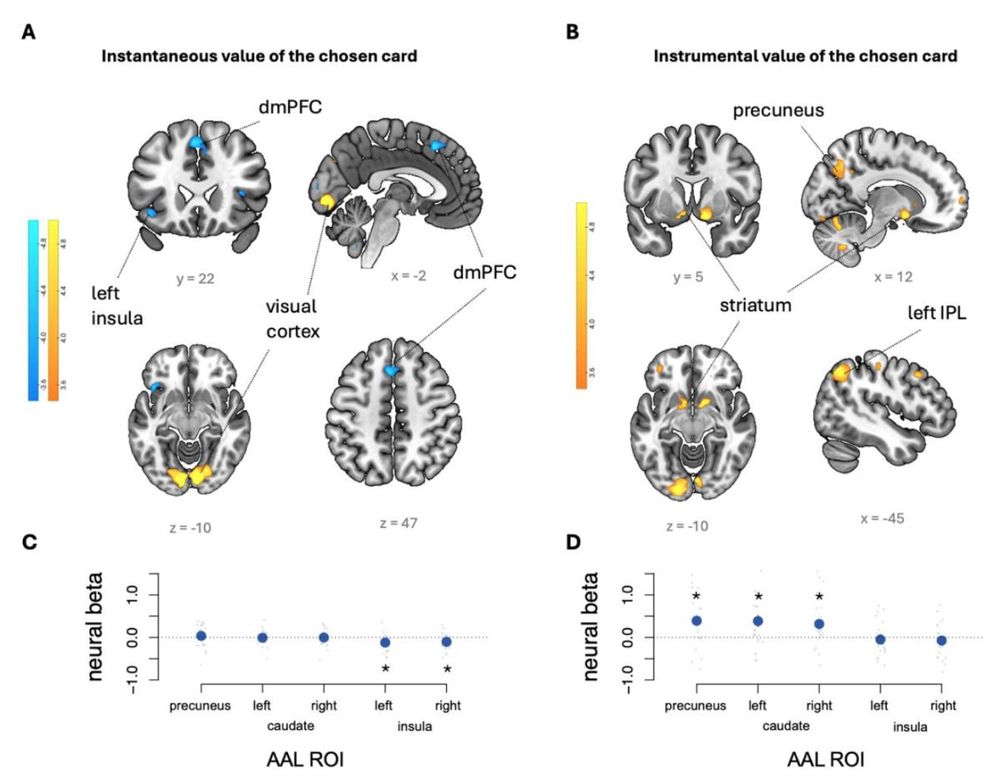War Trauma Impairs Prenatal Brain Development: Evidence from Genetically-Informed Brain Imaging https://www.biorxiv.org/content/10.1101/2025.11.05.686844v1
07.11.2025 05:15 — 👍 3 🔁 2 💬 0 📌 0

Neurocomputational Mechanisms of Cooperative Behaviour at University of Birmingham on FindAPhD.com
PhD Project - Neurocomputational Mechanisms of Cooperative Behaviour at University of Birmingham, listed on FindAPhD.com
📢 PhD opportunity 📢
Looking for a PhD in neuroeconomics, social, or decision neuroscience? I'm looking to support an application for the MIBTP ESRC program starting Fall 2026. Details below, but please get in touch with me before applying!
Pls share!
www.findaphd.com/phds/project...
07.11.2025 11:57 — 👍 7 🔁 12 💬 0 📌 0
👇Check out our new pre-print 👇
07.11.2025 09:38 — 👍 0 🔁 0 💬 0 📌 0
War Trauma Impairs Prenatal Brain Development: Evidence from Genetically-Informed Brain Imaging https://www.biorxiv.org/content/10.1101/2025.11.05.686844v1
07.11.2025 05:15 — 👍 3 🔁 1 💬 0 📌 1

Acute stress reduces risk-aversion by changing magnitude perception
Stress is thought to impair financial decision-making by influencing the willingness to take risks. This effect is commonly attributed to stress-related changes in affective evaluation of rewards and ...
1/ 🚨 New preprint: Acute stress doesn’t just change feelings—it warps how big payoffs look, pushing people to be more risk-seeking than usual.
👉 “Acute stress reduces risk-aversion by changing magnitude perception.” doi.org/10.1101/2025...
@gillesdehollander.bsky.social @saurabhbedi.bsky.social
05.11.2025 21:44 — 👍 0 🔁 0 💬 1 📌 0

📢 New preprint 📢
(with Daniil Luzyanin)
We use a new task to distinguish between the instantaneous and instrumental (goal-oriented) value of the same choice option in the brain using fMRI: biorxiv.org/content/10.1...
15.09.2025 10:36 — 👍 5 🔁 3 💬 0 📌 0
👉Great work by my colleagues at @econ.uzh.ch
03.10.2025 08:58 — 👍 0 🔁 0 💬 0 📌 0
OSF
For more, check out our preprint at osf.io/preprints/ps...
And special shout out to my co-authors who made this possible📣📷<🙏👏
@niklasbuergi.bsky.social @arkadykonovalov.bsky.social and Christian C. Ruff
#neuroeconomics
(5/5)
24.11.2024 16:29 — 👍 1 🔁 0 💬 0 📌 0

Finally, using machine learning, we've decoded adaptive mentalization with remarkable accuracy (r ~ .8), and thus are able to predict out-of-sample one's belief update with high precision. 🔎🧠 (4/5)
24.11.2024 16:29 — 👍 1 🔁 0 💬 1 📌 0

We term this behavior adaptive #mentalization , which is predominantly encoded within the social brain network. This underscores the pivotal role of areas such as the TPJ in updating beliefs about others' strategies. #neuroeconomics (3/5)
24.11.2024 16:29 — 👍 1 🔁 0 💬 1 📌 0

In repeated ✊🖐️✌️-like games, players don't rigidly stick to a single level of thinking (e.g., 'I think that you think' etc.), but dynamically adjust to their opponent's level.
Our new Bayesian model CHASE captures and characterizes this adaptive behavior! #gametheory
(2/5)
24.11.2024 16:29 — 👍 2 🔁 0 💬 1 📌 0

🤔How do humans anticipate an opponent's moves in strategic games?
Excited to share our latest work on #mentalization in strategic games.
After years of work, we've empirically validated our new model, behaviorally (N~500) and neurally (N~100) 🧠 a 🧵 (1/5)
24.11.2024 16:29 — 👍 3 🔁 1 💬 1 📌 0
Postdoc passionate about effort-based decision-making and the roots of effort aversiveness.
If you are on Mastodon, my profile is: @nicolasclairis@fediscience.org
Former health professional with an increasingly
ridiculous mishmash of learned knowledge and lived experience.
Living on Arrernte country.
Please be kind 💚
Lecturer, University of St Andrews | I work on cooperation, norms, institutions, & personality | http://simoncolumbus.com
Postdoc @ Icahn School of Medicine. Computational Psychiatry. Neuroeconomics. Decision-Making
Economist working w/ monkeys. Postdoc at @WUSTLneurosci & @WUSTL / PhD @econ_uzh
Medical Director at Anna Freud, London and co lead for Mental Health, Cambridge Children's Hospital. Child and Adolescent Psychiatrist. Co-founder of AMBIT.
UCLA Psychology lab that studies Neuroeconomics, Decision Psychology/Neuroscience, Cognitive Psychology/Neuroscience/Economics, etc. We specialize in combining mathematical models with choice-process measures.
Interested in #Cognition (#Memory #DecisionMaking) and #Motivation from a #Developmental #Lifespan view. Also some #CognitiveModeling | Zurich Switzerland.
Psicopedagogo aspirante a divulgador y escritor | Hilos sobre ciencias cognitivas cada sábado | Cuenta personal: @gabangel.bsky.social.
Professor for Cognitive Modelling & Decision Neuroscience (@cmdn-lab.bsky.social) at the University of Hamburg (@uni-hamburg.de). Interested in raising two kids, bouldering, football, and other things (if time permits).
At the CMDN Lab (@uni-hamburg.de), we study decision-making and how it is influenced by attention, learning and memory.
PI: @sgluth.bsky.social
Account managed by: @jennamarch.bsky.social
Sentientism, food policy for desired/anticipated consumption patterns, plant-based for climate, consumption behaviour, history and reporting of global goals, framing.
Social neuroscience | EEG/ERP | Morality, hierarchy & deception | RA @ NeuroCognition and Brain Dynamics Lab | Obsessed with how people make social decisions under uncertainty.
Postdoctoral fellow at PROMENTA, University of Oslo.
Genetics – Intergenerational Transmission of Inequalities – Mental Health – Education
https://perlinedemange.github.io/
mres in econ at uclouvain










